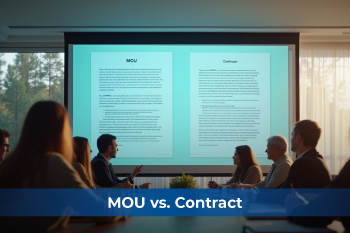
Key Differences Between MOUs and Contracts in the UAE
In today’s business world, putting agreements in writing is more than a formality — it is a way of building trust and ensuring clarity. In the UAE, two documents often come up when parties start discussions: the Memorandum of Understanding (MOU) and the contract. While both may appear similar at first glance, they play very different roles. One reflects intentions and mutual understanding, while the other enforces obligations, formalizing the agreement. Knowing the difference can save parties from costly misunderstandings later.
Key Differences Between MOUs and Contracts
1. Legal Enforceability
The first distinction lies in enforceability. An MOU is generally non-binding. It is often used to set out intentions and guide discussions. That said, under UAE law, certain provisions in an MOU, such as confidentiality or exclusivity, may still be legally binding if drafted clearly.
A contract, however, is fully binding and enforceable in UAE courts. Once signed, it creates legal obligations, and failure to comply can lead to remedies such as damages or even enforcement of performance.
2. Purpose
The purpose of an MOU is to provide a starting point. It allows parties to put their shared vision on paper, confirm their willingness to cooperate, and outline how they might work together without the pressure of immediate legal commitment.
A contract is different. It is used once the deal is ready to be finalized. A contract sets out agreed terms, locks in obligations, and ensures that both parties have a legally enforceable framework to rely on.
3. Level of Detail
An MOU is broad and flexible. It captures intentions and general objectives without going into complex detail. This flexibility is useful when discussions are still evolving.
A contract is detailed and precise. It spells out obligations, payment terms, timelines, liabilities, and dispute resolution mechanisms. Every clause is drafted to remove ambiguity and protect the interests of both parties.
4. Consequences of Breach
Failing to follow an MOU usually has limited consequences, since most of its provisions are not enforceable. The exception arises when the MOU includes clauses that are specifically drafted as binding.
Breaching a contract carries legal consequences. The affected party has the right to approach UAE courts to seek damages, penalties, or direct enforcement of obligations.
Conclusion
While MOUs and contracts both play a role in business dealings, they are not interchangeable. An MOU is best suited for the early stages of negotiation, when flexibility is needed. A contract is the right choice when parties are ready for certainty and enforceability.
At Legal Inz, our team offers trusted legal services in Dubai, helping clients draft, review, and finalize both contracts and MOUs in Dubai, UAE, with precision. We ensure that every agreement not only reflects your intentions but also safeguards your legal interests. With the right guidance and documentation, businesses in the UAE can move forward with clarity, confidence, and protection.
FAQs on MOUs in the UAE
1. Is an MOU legally binding in the UAE?
In most cases, a Memorandum of Understanding (MOU) is not legally binding in the UAE. It mainly records the intention of parties to cooperate. However, if specific clauses (such as confidentiality or exclusivity) are drafted as binding, those provisions can be enforced by UAE courts.
2. What happens if you break an MOU?
Since MOUs are generally non-binding, breaking one usually has no legal consequences. That said, if the MOU includes binding clauses, a breach could lead to legal action, financial penalties, or reputational harm depending on the terms agreed.
3. What are the two types of MOU?
MOUs are generally of two types: bilateral, which involve two parties, and multilateral, which involve three or more parties coming together under one agreement.





 verified reviews
verified reviews

